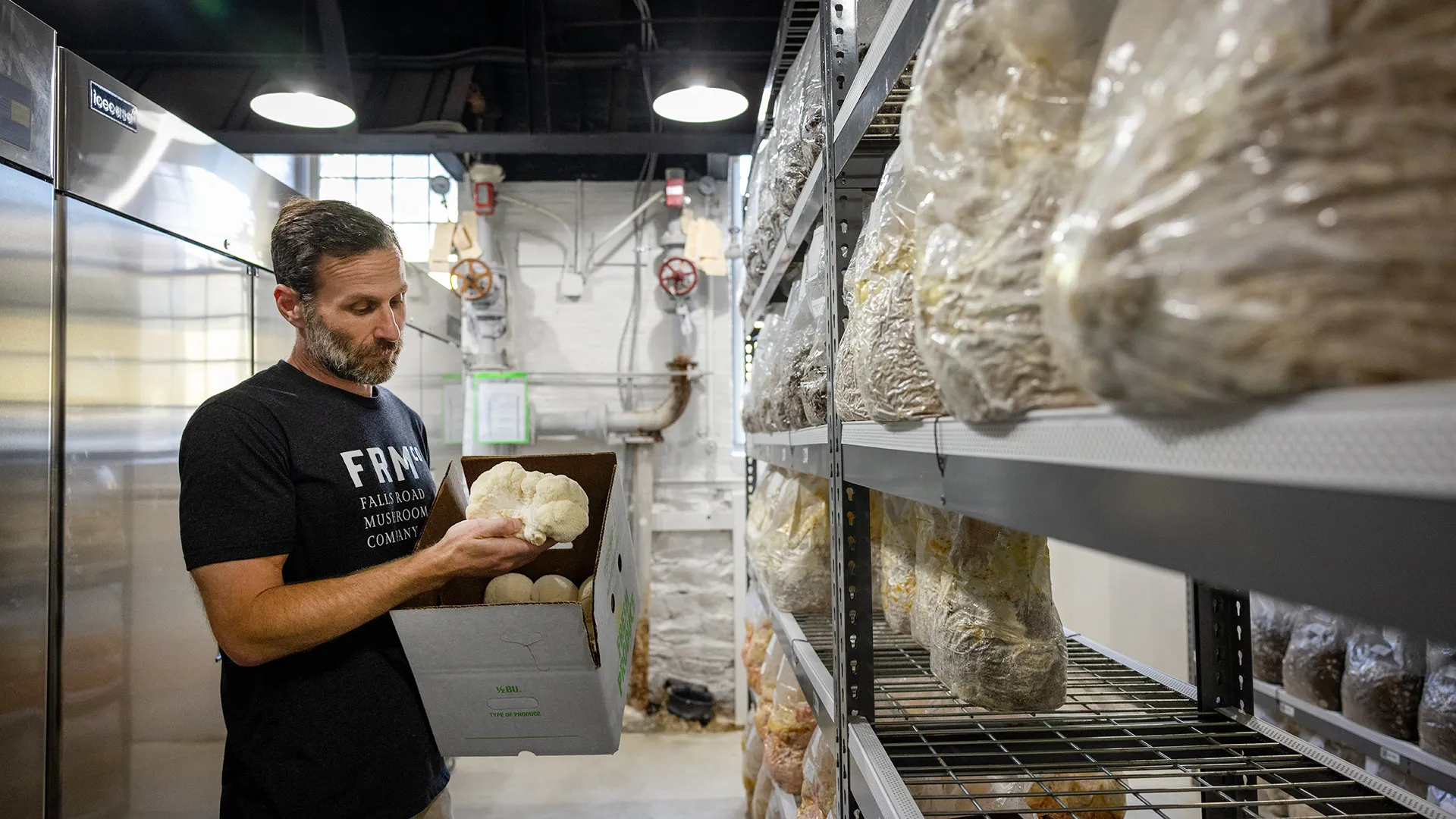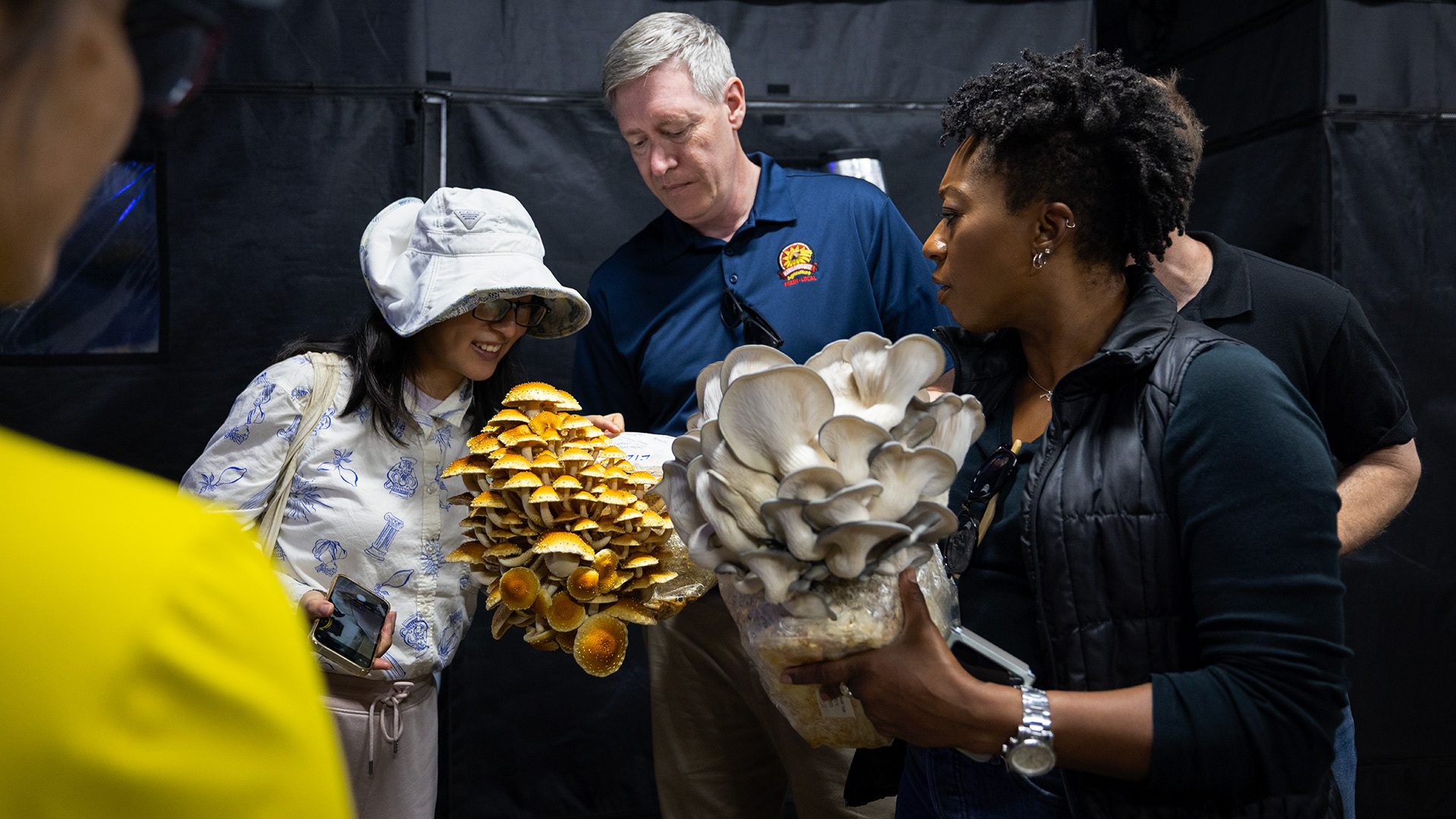- October 08, 2025
- By John Tucker
After two decades toiling in commercial real estate, Baltimorean Jon Manekin wanted a more fulfilling career. Accustomed to brokering deals for buildings, he repurposed one himself as an urban farm.
University of Maryland Extension (UME) experts assisted him in launching Falls Road Mushroom Company in January out of a 100-year-old former textile mill. On Monday, UME helped Manekin show off his operation to Maryland Department of Agriculture Secretary Kevin Atticks and Baltimore elected officials as part of its initiative introducing Atticks to farmers and food entrepreneurs in every Maryland county.
In addition to Manekin’s farm, Atticks’ team made four other stops in the city on Monday, offering a perspective unseen in Maryland’s rural areas.
“In Baltimore you’ve got multiple layers of government regulations that can be complicated for farmers to comply with, in a place where traditionally there haven’t been farmers,” said Neith Little, the urban agriculture extension educator for Baltimore. “We want state officials and delegates to understand what it’s like to run a food business here so they can make policies work a little better for them.”

“Mushroom farming is an up-and-coming business embracing sustainability and health, and hopefully Jon’s business will be a model for other folks to build off of in Maryland,” said Shauna Henley, a senior extension agent for UMD’s Family and Consumer Sciences Program and part of the team that helped Manekin launch his operation out of a repurposed Baltimore textile mill.
After greeting Atticks, Manekin led his team through a 2,800-square-foot cavern, where the aroma of grain filled the cool air, and explained the growing process: After gathering sawdust and soy hulls from 1-ton bags, he boils the mix for 16 hours, encases it in smaller bags and inoculates each one with varying types of mushroom spawn. He places them on large shelves where they rest as the fungi grows. Next, they’re transferred to moisture-controlled, pesticide-free fruiting tents that mimic a natural habitat and begin sprouting a few weeks later, producing 1,000 pounds of delectable mushrooms that he sells each week to restaurants and country clubs.
During the tour, Manekin emerged from a tent carrying a cluster of spongy, cream-colored Lion’s mane mushrooms the size of a basketball. “Don’t worry, it won’t bite,” he said.
“Oh my gosh, isn’t it gorgeous?” Atticks said, clutching the bundle. “Anybody bring their butter and garlic?”
Manekin began working with UMD educators last year, seeking help navigating complex state and federal regulations and local permitting difficulties. “I could spend 48 hours learning how to grow mushrooms, but learning the legal parameters allowing a mushroom business to operate in Maryland—there was no straightforward answer,” he said. The UMD team also helped him develop a food safety plan and will soon assist him in obtaining a license through its entrepreneurship coaching program.
“Farmers want to farm,” Carol Allen, agent associate in food safety with UMD, said later. “Do they really want to spend 60 hours on a computer banging out a safety plan from scratch? We help them meet the requirements.”
As it zigzagged through the city on Monday, Atticks’ team met with growers from Strength to Love II, a West Baltimore urban farm whose 14 greenhouse-like high tunnels stand on the former site of vacant homes. Located in a food desert, where businesses selling fresh produce and other healthy food are scarce, the farm employs and sells to local residents and partners with area food pantries and the Maryland Food Bank.
Jonathan Wirth, Strength to Love II’s program director and farm manager, said Atticks’ visit was meaningful. “If the Department of Agriculture is looking for a substantial impact for not a ton of effort, urban farms give them that opportunity,” he said.
Atticks called Monday’s experience “amazing,” saying, “We’ve been able to see the incredible opportunities and diversity of operations that urban farming can provide.”
